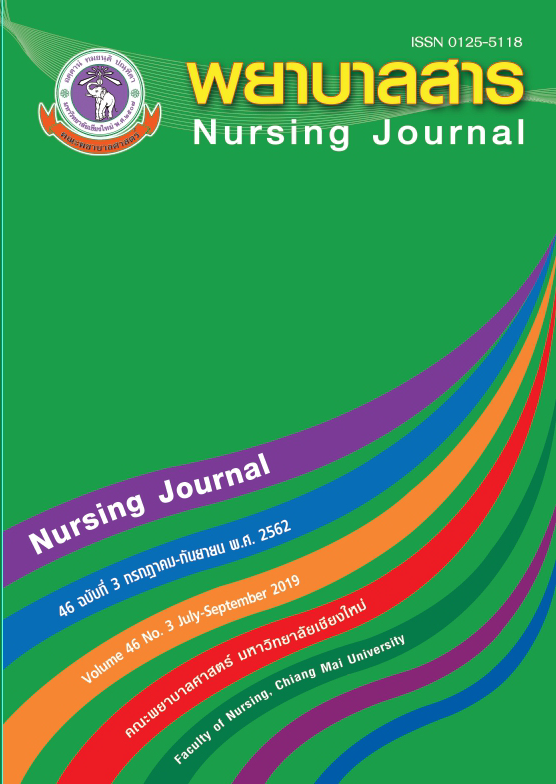Effects of Self-efficacy Enhancement on Health Behaviors, Body Weight, Body Mass Index and Waist Circumference Among Persons with Metabolic Syndrome
Keywords:
Self-efficacy Promotion, Health Behaviors, body weight, waist circumference, Metabolic SyndromeAbstract
Persons with metabolic syndrome are at high risk of cardiovascular disease, diabetes and non-communicable diseases. Perceived self-efficacy in health behavior modification is essential. This quasi-experimental study aimed to examine the effects of self-efficacy promotion on health behaviors, body weight, body mass index, and waist circumference among persons with metabolic syndrome. The participants were persons with metabolic syndrome who attended the Out Patient Department, Srisangwan Hospital, Meahongson province, from March to April 2015. Fifty-four of participants were purposively selected and randomly assigned to experimental and control groups with 27 participants in each group. Participants in the experimental group received self-efficacy enhancement from the researcher, while those in the control group received routine service care. Research instruments consisted of a demographic data recording form, a Health Behaviors of Metabolic Syndrome Persons questionnaire, a Perceived Self-efficacy of Metabolic Syndrome Persons questionnaire, a Metabolic Syndrome Persons Self-efficacy Enhancement Plan, and a Health Behaviors of Metabolic Syndrome Persons handbook. Data were analyzed by using descriptive statistics and the t-test for independent sample.
The results revealed that: 1. The health behaviors of persons with metabolic syndrome who received self-efficacy enhancement were significantly better than those who received routine service care (p< .001) 2. The body weight of persons with metabolic syndrome who received self-efficacy enhancement was significantly less than those who received routine service care (p< .001) 3.The body mass index of persons with metabolic syndrome who received self-efficacy enhancement was significantly less than those who received routine service care (p< .001) 4.The waist circumference of persons with metabolic syndrome who received self-efficacy enhancement was significantly less than those who received routine service care (p< .001).
The results from this study demonstrated that self-efficacy enhancement among persons with metabolic syndrome yielded desired outcomes. Therefore, self-efficacy enhancement is suggested as one of the means to improve quality of care among the population per se.
References
(2009). Harmonizing the Metabolic Syndrome : A Joint Interim Statement of the International Diabetes Federation Task Force on Epidemiology and Prevention; National Heart, Lung, and Blood Institute; American Heart Association; World Heart Federation; International Atherosclerosis Society; and International Association for the Study of Obesity. Journal of The American Heart Association, 120, 1640-1641. doi:10. 1161/ CIRCULATIO NAHA.109.192644
Bandura, A. (1997). Self-efficacy: The exercise of control. Newyork: W.H. Freeman Companny.
Beltrán-Sánchez. H., Harhay. M. O., Harhay. M. M., & McElligott, S. (2013) Prevalence and
trends of metabolic syndrome in the adult U.S. population, 1999-2010. J Am Coll Cardiol. 62(8): 697–703.doi:10.1016/j.jacc.2013.05.064
Chatnom, D. (2008). Relationship between Life and metabolism Syndrome in male naval
officers Bangkok and suburbs. Master. Public Health Science (Epidemiology)
Research Report. Mahidol University. (In Thai)
Cornier, M. A., Dabelea, D., Hernandez, T. L., Lindstrom, R. C., Steig, A. J., Stob, N. R., Eckel,
R. H. (2008). The metabolic syndrome. Endocrine Reviews, 29(7), 777–822. doi:10. 1210/ er.2008-0024
Ekpalaakarn, W. (2010). The survey of the Thai public health by the 4th physical examination
in the year 2008-2009. Nonthaburi: De Grafico Systems Company Limited. (In Thai)
Health Promotion Group, Srisangwan Hospital. (2012). Report on screening of chronic disease
risk groups Preliminary 2012. Mae Hong Son: Department of Social Medicine
Srisangwan Hospital. (in Thai)
International Diabetes Federation. (2006). The IDF worldwide definition of the metabolic
Syndrome. Retrieved from http://www.idf.org/webdata/docs/IDF_Meta_def_final.pdf
Johannsen, D.L., Redman, L. M., Ravussin, E. (2007). The role of physical activity in maintaining
a reduced weight. Nature Clinical Practice Endocrinology & Metabolism, 9, 463–471. doi:10.1038 /ncpendmet0554
Kassi, E., Pervanidou, P., Kaltsas, G., & Chrousos, G. (2011). Metabolic syndrome: definitions
and controversies. BMC Medicine, 9, 48-59. Retrieved from http://www.biomedcentral. com/ 1741-7015/9/48
Kaur, J. (2014). A Comprehensive Review on Metabolic Syndrome. Cardiology Research and
Practice, 2014, 1-21. doi.org/10.1155/2014/943162.
Urairikkul, C. (2009). Metabolic Syndrome and Chronic NCD: Metabolic syndrome and Chronic
non-communicable diseases. Retrieved May 3, 2013, from http://hpe4.anamai.
moph. go.th/hpe/data/ms/ PrimaryPre vention NCD.pdf. (In Thai)
Scholze, J., Alegria, E., Ferri, C., Langham, S., Stevens, W., Jeffries, D., & Uhl-Hochgraeber, K.
(2010). Epidemiological and economic burden of metabolic syndrome and its consequences in patients with hypertension in Germany, Spain and Italy; a prevalence-based model. BMC Public Health, 10:529-531. doi:10.1186/1471-2458-10-529
Sinlapakampiset, K., Sukkhum, W., & Sumrit W.(2011). Effectiveness of self-efficacy on
consumption behavior exercise and body mass index of the elderly. Journal of Public
Health Nursing, 25(3), 31-47. (In Thai)
Tawornrungrojn, S., Srithara, P., Saengwattanaroj, S., & Wasuntharawat, C. (2009). The
Metabolic Syndrome in Persons Exercising at Various Intensities. Nursing Journal
Public Health, 23(1), 17-32. (In Thai)
Videch, S. (2011). Effectiveness of Health Education Program Applying Self-Efficacy on Health
Behavior of Overweight Students. Master. Science (Health Education) Research
Report. Srinakharinwirot University. (In Thai).
Wiriyakun, R. (2010). An application of self-efficacy theory and social support on health
promoting among Metabolic syndrome of Klang Plaza workers in Nakhon Ratchasima
Province. Master. Public Health Science (Community health development) Research
Report. Rajabhat University. (In Thai)
Wongsombut, C. (2008). Effects of health promoting self-efficacy program on waist
circumference, body mass index and blood pressure of overweight adults.
Master. Nursing Science (Nursing Education) Research Report. Chulalongkorn
University. (In Thai)
Wongsricha, W. (2012). Applicationof Self-efficacy Program for Changing Health Behaviors in
Diabetes high risk group at Nakae Community Hospital, Nakhonpanom Province.
Master. Nursing Science (Community Nursing) Research Report.Khon Kaen University.
(In Thai)
Downloads
Published
How to Cite
Issue
Section
License
บทความที่ได้รับการตีพิมพ์เป็นลิขสิทธิ์ของวารสารพยาบาลสาร
ข้อความที่ปรากฏในบทความแต่ละเรื่องในวารสารวิชาการเล่มนี้เป็นความคิดเห็นส่วนตัวของผู้เขียนแต่ละท่านไม่เกี่ยวข้องกับมหาวิทยาลัยเชียงใหม่ และคณาจารย์ท่านอื่นๆในมหาวิทยาลัยฯ แต่อย่างใด ความรับผิดชอบองค์ประกอบทั้งหมดของบทความแต่ละเรื่องเป็นของผู้เขียนแต่ละท่าน หากมีความผิดพลาดใด ๆ ผู้เขียนแต่ละท่านจะรับผิดชอบบทความของตนเองแต่ผู้เดียว






